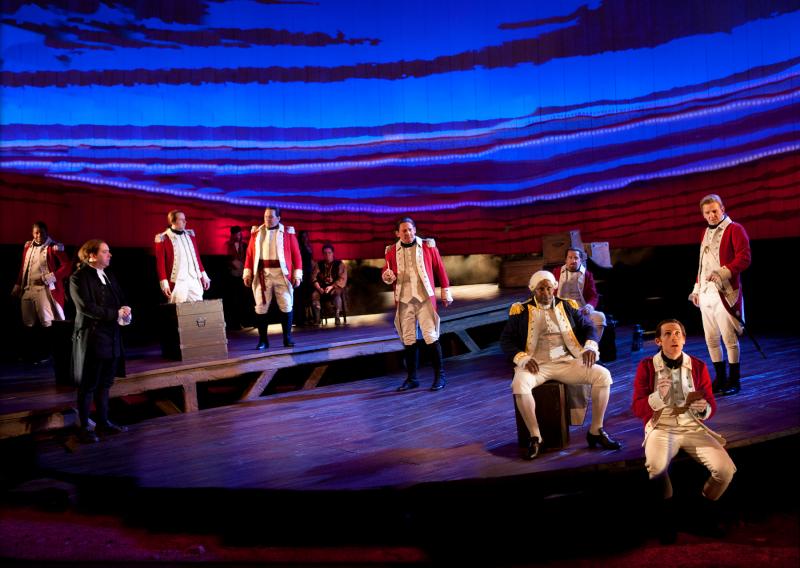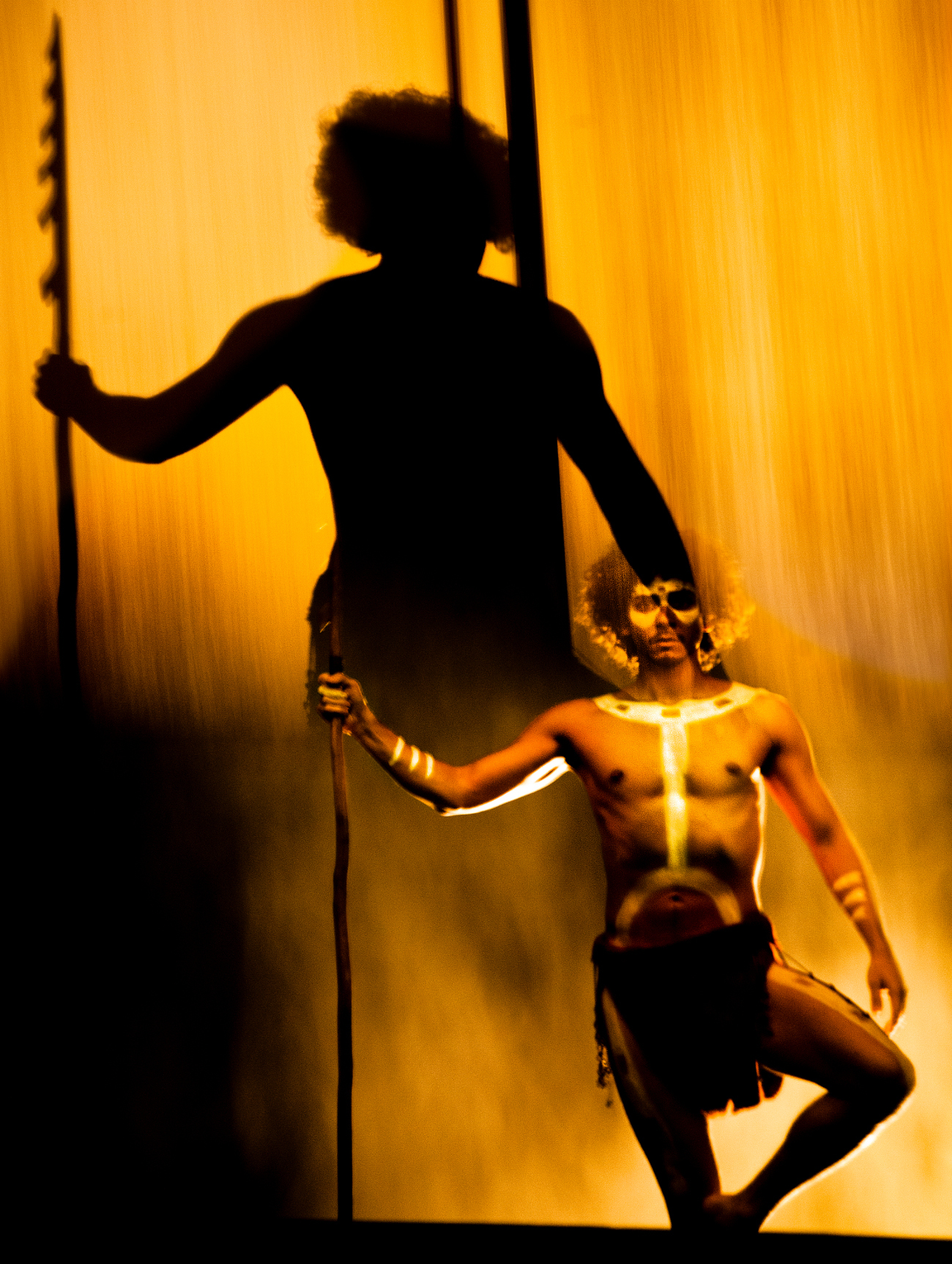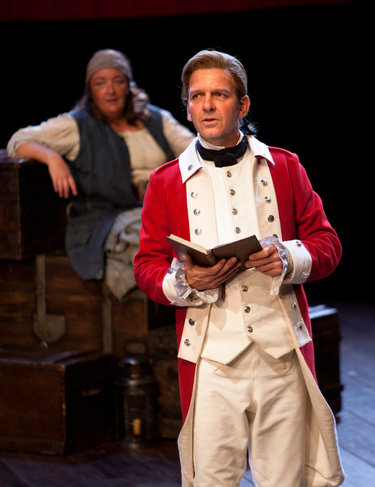Our Country's Good, National Theatre | reviews, news & interviews
Our Country's Good, National Theatre
Our Country's Good, National Theatre
Moments of poignancy and humour don't quite add up to this play's full dramatic weight

The political wheel has turned full-circle. When Our Country’s Good was premiered in 1988, it was a barely-veiled protest against Thatcher’s slash-and-burn approach to the arts in general and arts funding in particular. It couldn’t have returned at a more apt moment.
A superb ensemble cast blarney and rage and love with desperate intensity
Timberlake Wertenbaker’s passionate theatrical polemic takes us back to the Australia of the First Fleet, bedding us down among the officers and convicts that made up those initial, unwilling settlers of Sydney’s inhospitable harbour. Peter McIntosh’s designs give us a bright, hot landscape, abstractly suggested in a vast projected backdrop, pitted and striated in the thick brush strokes of Aboriginal art. In front, a clever revolve rises and falls as it rotates, capturing the above-deck/below-deck duality that persists long after we escape the confines of the ship.
It’s a shame that casting in this new National Theatre production forgoes the traditional doubling of roles that sees prisoners become jailers in the simple act of donning a red coat or a hat. It’s a gesture that cuts to the essence of a play that questions so persistently the conventions, opportunities and ideologies that keep us locked in a social hierarchy. But if status is less fluid in director Nadia Fall’s hands than often, the pay-off is an additional bleakness, a cruelty that traps our convicts twice over.
 Reduced to its dramatic skeleton of plot and themes, Our Country’s Good can sound unbearably earnest – an A-level civics lesson in narrative form. It’s in the playing, the theatrical experiences moment to moment that it lives. The deft pencil-sketches of character that fill out the supporting cast are tender and funny, whether the dogmatic John Wisehammer whose book-learning only extends as far as the letter "L" on account of only having the first volume of the dictionary, or voluble young Ketch Freeman, the unwilling hangman who only wants to do the best job he can.
Reduced to its dramatic skeleton of plot and themes, Our Country’s Good can sound unbearably earnest – an A-level civics lesson in narrative form. It’s in the playing, the theatrical experiences moment to moment that it lives. The deft pencil-sketches of character that fill out the supporting cast are tender and funny, whether the dogmatic John Wisehammer whose book-learning only extends as far as the letter "L" on account of only having the first volume of the dictionary, or voluble young Ketch Freeman, the unwilling hangman who only wants to do the best job he can.
It’s in these generous, backstory-loaded cameos that Fall’s show comes into its own. A superb ensemble cast blarney and rage and love with desperate intensity. Tadhg Murphy is all nervous energy and misguided endeavour as Freeman, his undimmed sweetness sparring (and ultimately supporting) Jodie McNee’s bruised, feral and vehemently Liverpudlian Liz Morden. Transformed by a wooden “fan” her transformation from violent kneejerk rage to soft dignity is beautifully managed. Only Ashley McGuire's Dabby Bryant, longing for her childhood Devon home, comes close to her for pathos.
Fall humanises the priggish Second Lieutenant Ralph Clark (Jason Hughes, pictured below) with some deft touches. His “prayers” over his wife’s photograph are rather less than spiritual, his courtship with Mary Brenham (a slow-burn performance from Caoilfhionn Dunne) deliciously tentative. Hughes’s plain-dealing, plain-speaking charisma dominates scenes among the officers, filling the dramatic void where Cyril Nri’s gently ineffectual Captain Phillip should be.
 Much has been made of the production’s music in the run-up to opening night – the debut stage score from Catatonia and Radio 6 Music’s Cerys Matthews. Folk-tunes jostle with delicate contemporary pop songs in a tuneful melee, but the dominance of music in the production fatally unbalances the action. If our characters have such easy and instinctive an outlet for self-expression in song, then why do they need the play at all? Already emancipated in song, the characters anticipate their own theatrical growth and assurance. It doesn’t help that Matthews’ music (much of it beautifully sung by Josienne Clarke) often errs towards the literal in its response to the play’s action, seizing on the emotional moment with a melodic urgency that comes dangerously close to Les Miserables at times.
Much has been made of the production’s music in the run-up to opening night – the debut stage score from Catatonia and Radio 6 Music’s Cerys Matthews. Folk-tunes jostle with delicate contemporary pop songs in a tuneful melee, but the dominance of music in the production fatally unbalances the action. If our characters have such easy and instinctive an outlet for self-expression in song, then why do they need the play at all? Already emancipated in song, the characters anticipate their own theatrical growth and assurance. It doesn’t help that Matthews’ music (much of it beautifully sung by Josienne Clarke) often errs towards the literal in its response to the play’s action, seizing on the emotional moment with a melodic urgency that comes dangerously close to Les Miserables at times.
A briskly unsentimental programme essay by Roger Graef is the play’s natural epilogue, turning up the house-lights of contemporary reality just as Phyllida Lloyd’s recent Donmar Shakespeares set in a women’s prison have done. His tale of the institutional suspicion among officials at Wandsworth Prison of a recent inmate production of West Side Story is depressingly and distressingly predictable, but also a necessary reminder that today’s cultural vandals don’t all come equipped with red coats.
- Our Country's Good at the National Theatre until 17 October
rating
Explore topics
Share this article
Add comment
The future of Arts Journalism
You can stop theartsdesk.com closing!
We urgently need financing to survive. Our fundraising drive has thus far raised £49,000 but we need to reach £100,000 or we will be forced to close. Please contribute here: https://gofund.me/c3f6033d
And if you can forward this information to anyone who might assist, we’d be grateful.

Subscribe to theartsdesk.com
Thank you for continuing to read our work on theartsdesk.com. For unlimited access to every article in its entirety, including our archive of more than 15,000 pieces, we're asking for £5 per month or £40 per year. We feel it's a very good deal, and hope you do too.
To take a subscription now simply click here.
And if you're looking for that extra gift for a friend or family member, why not treat them to a theartsdesk.com gift subscription?
more Theatre
 The Gathered Leaves, Park Theatre review - dated script lifted by nuanced characterisation
The actors skilfully evoke the claustrophobia of family members trying to fake togetherness
The Gathered Leaves, Park Theatre review - dated script lifted by nuanced characterisation
The actors skilfully evoke the claustrophobia of family members trying to fake togetherness
 As You Like It: A Radical Retelling, Edinburgh International Festival 2025 review - breathtakingly audacious, deeply shocking
A cunning ruse leaves audiences facing their own privilege and complicity in Cliff Cardinal's bold theatrical creation
As You Like It: A Radical Retelling, Edinburgh International Festival 2025 review - breathtakingly audacious, deeply shocking
A cunning ruse leaves audiences facing their own privilege and complicity in Cliff Cardinal's bold theatrical creation
 Edinburgh Fringe 2025 reviews: Refuse / Terry's / Sugar
A Ukrainian bin man, an unseen used car dealer and every daddy's dream twink in three contrasting Fringe shows
Edinburgh Fringe 2025 reviews: Refuse / Terry's / Sugar
A Ukrainian bin man, an unseen used car dealer and every daddy's dream twink in three contrasting Fringe shows
 Faustus in Africa!, Edinburgh International Festival 2025 review - deeply flawed
Bringing the Faust legend to comment on colonialism produces bewildering results
Faustus in Africa!, Edinburgh International Festival 2025 review - deeply flawed
Bringing the Faust legend to comment on colonialism produces bewildering results
 Edinburgh Fringe 2025 reviews: Imprints / Courier
A slippery show about memory and a rug-pulling Deliveroo comedy in the latest from the Edinburgh Fringe
Edinburgh Fringe 2025 reviews: Imprints / Courier
A slippery show about memory and a rug-pulling Deliveroo comedy in the latest from the Edinburgh Fringe
 Edinburgh Fringe 2025 reviews: The Ode Islands / Delusions and Grandeur / Shame Show
Experimental digital performance art, classical insights and gay shame in three strong Fringe shows
Edinburgh Fringe 2025 reviews: The Ode Islands / Delusions and Grandeur / Shame Show
Experimental digital performance art, classical insights and gay shame in three strong Fringe shows
 Edinburgh Fringe 2025 reviews: Ordinary Decent Criminal / Insiders
Two dramas on prison life offer contrasting perspectives but a similar sense of compassion
Edinburgh Fringe 2025 reviews: Ordinary Decent Criminal / Insiders
Two dramas on prison life offer contrasting perspectives but a similar sense of compassion
 Edinburgh Fringe 2025 reviews: Kinder / Shunga Alert / Clean Your Plate!
From drag to Japanese erotica via a French cookery show, three of the Fringe's more unusual offerings
Edinburgh Fringe 2025 reviews: Kinder / Shunga Alert / Clean Your Plate!
From drag to Japanese erotica via a French cookery show, three of the Fringe's more unusual offerings
 The Two Gentlemen of Verona, RSC, Stratford review - not quite the intended gateway drug to Shakespeare
Shakespeare trying out lots of ideas that were to bear fruit in the future
The Two Gentlemen of Verona, RSC, Stratford review - not quite the intended gateway drug to Shakespeare
Shakespeare trying out lots of ideas that were to bear fruit in the future
 Edinburgh Fringe 2025 reviews: The Horse of Jenin / Nowhere
Two powerful shows consider the Israeli-Palestinian conflict, with mixed results
Edinburgh Fringe 2025 reviews: The Horse of Jenin / Nowhere
Two powerful shows consider the Israeli-Palestinian conflict, with mixed results
 Edinburgh Fringe 2025 reviews: The Fit Prince / Undersigned
A joyful gay romance and an intimate one-to-one encounter in two strong Fringe shows
Edinburgh Fringe 2025 reviews: The Fit Prince / Undersigned
A joyful gay romance and an intimate one-to-one encounter in two strong Fringe shows
 Tom at the Farm, Edinburgh Fringe 2025 review - desire and disgust
A visually stunning stage re-adaptation of a recent gay classic plunges the audience into blood and earth
Tom at the Farm, Edinburgh Fringe 2025 review - desire and disgust
A visually stunning stage re-adaptation of a recent gay classic plunges the audience into blood and earth

Comments
Why does the actor playing
Since when has a critic been